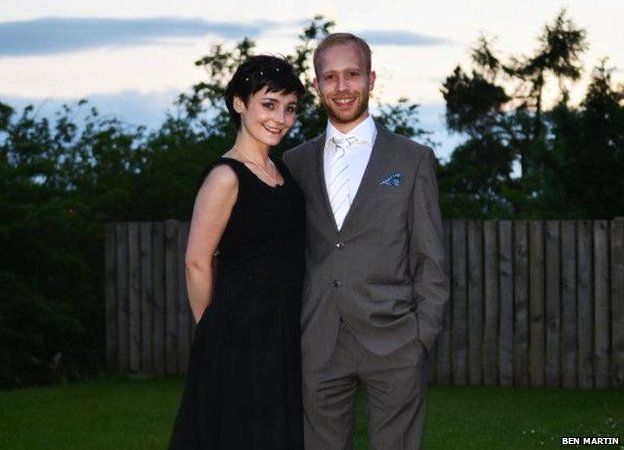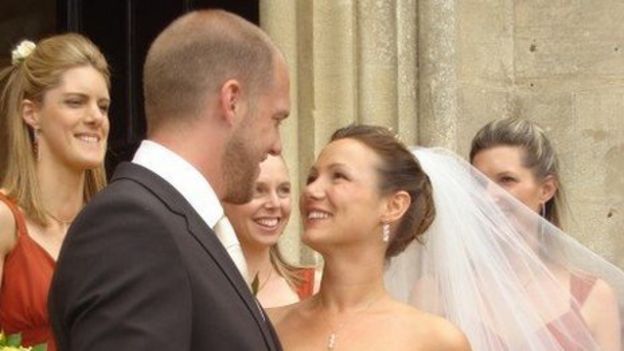American actress Zoe Saldana has responded to criticism following her husband's decision to adopt her surname after marriage. It's usually women who take their partner's name - but are things changing?
"Why is it so surprising, shocking- eventful that a man would take his wife's surname?," asks Zoe Saldana on her Facebook page.
"Men, you will not cease to exist by taking your partner's surname. On the contrary you will be remembered as a man who stood by change," she writes.
More women are keeping their surnames, or hyphenating them with their partners', but the patriarchal tradition of a man holding onto his prevails.
But times, and names, are slowly changing.
Ben Martin (ne Coghill) is one of a new breed of men, who are taking their wife's surname.

Ben Coghill changed his surname after marriage
The 32-year-old music promoter from Glasgow, Scotland, says he didn't think anything of it.
"I really liked the sound of my wife's name - Rowan Martin - and didn't want to spoil that with her changing it."
At the beginning, Ben's sister had some concerns it would be the end of the line for the family name, but she was soon won over. "I explained to her, 'what's in a name', it doesn't really matter. It wouldn't make a difference," he said.
"It shows I don't buy into this idea of patriarchy, and that I'm comfortable enough with who I am that I don't see it as anything at all."
It's difficult to know how many other men are following Ben Martin or Marco Saldana's lead because all of the research into married names focuses on a woman's decision.
A 2013 survey of 13,000 brides for the wedding website topknot.com found that the vast majority (80%) of females still choose to take their spouse's last name, although the numbers are falling as more retain their maiden name.
Claudia Goldin, a Harvard economist who co-authored a 2004 study into the subject, says her research showed a rise in college-educated women keeping their surnames from the mid 1970s onwards, corresponding to the rise of feminism, and as women began to make a professional name for themselves. In the 1990s the pace of change slowed down, as more women stuck with tradition.

Andy Brown became a 'Brownstone'
"The reason for the decrease in surname-keeping in the 1990s is not clear," says her report, "We can only speculate about the social factors that have caused surname-keeping to decrease... Perhaps surname-keeping seems less salient as a way of publicly supporting equality for women than it did in the late 1970s and 1980s,"
For the women who hang onto their surnames, the decision is often practical. Silicon Valley based psychologist Kathryn Welds says as more women work, their desire to retain a "personal brand" has grown.
But where does that leave the men who are changing? Welds says she only knows of two who've taken their spouse's name. "In both instances these men had distant relationships with their fathers and didn't feel positively towards them," she says.
And like most things in marriage, there's also the compromise option. Welds is also seeing more couples merging their surnames together to create a hybrid.
When BBC producer Andy Brown married Helen Stone, they became the Brownstones.
"Helen is one of two girls. Her sister was already married and had taken her husband's name," he says. "She didn't want the Stone to disappear and the name Brownstone just seemed to work.
"Helen and I also liked the idea of creating a new tribe."
Latest Stories
-
Livestream: Newsfile discusses KPMG report on SML deal, ILO on SSNIT reserves and NDC’s running mate
23 mins -
Ghanaian activist hugs over 1,100 trees in an hour to set Guinness World Records
24 mins -
Mathew Anim Cudjoe’s Dundee United promoted to Scottish Premiership after Championship win
25 mins -
NSMQ star Jochebed Adwoa Sutherland sweeps 12 awards at UG Vice-Chancellor’s Ceremony
1 hour -
Ghana’s Education Quality ranked 125 out of 183 countries in latest Global Youth Development Index
2 hours -
Emma Stone wants people to use her real first name
2 hours -
FIFA Club World Cup 2025: Sundowns, Esperance join Al Ahly and Wydad as CAF representatives
6 hours -
CAFCL: Al Ahly set up historic final with ES Tunis
6 hours -
We didn’t sneak out 10 BVDs; they were auctioned as obsolete equipment – EC
10 hours -
King Charles to resume public duties after progress in cancer treatment
10 hours -
Arda Guler scores on first start in La Liga as Madrid beat Real Sociedad
10 hours -
Fatawu Issahaku’s Leicester City secures Premier League promotion after Leeds defeat
11 hours -
Anticipation builds as Junior Speller hosts nationwide auditions
11 hours -
Etse Sikanku: The driver’s mate conundrum
12 hours -
IMF Deputy Chief worried large chunk of Eurobonds is used to service debt
12 hours

